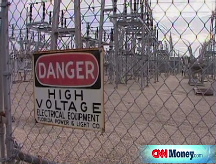Oil prices struggle on demand worries
Outlook for oil demand remains bleak this year amid faltering economy. February contract saw thin volume ahead of expiring
NEW YORK (CNNMoney.com) -- Oil prices ended higher Friday after seesawing following a major world energy report that projected demand for crude would continue to decline through 2009.
U.S. crude for February delivery ended the day up $1.11 to $36.51 a barrel, but not before falling as low as $34.18.
The contract expires next Tuesday and most traders are already focused on the March contract, which saw nearly four times the amount of volume compared with February. Crude prices for the March contract settled down 97 cents at $42.47 a barrel.
"All attention now is on the March contract," said Stephen Schork, energy analyst and publisher of trading newsletter The Schork Report. "We're still headed lower once the February contract goes off the board."
The February contract was also getting a boost Friday from a weaker dollar because oil is priced in the U.S. currency.
IEA 2009 demand: In its monthly oil report, The International Energy Agency said that global demand for oil this year would sink to 85.3 million barrels a day, down 500,000 barrels from 2008. The group's previous projection for 2009 demand was about 1 million barrels a day higher.
The IEA pointed to continued weakness of the global gross domestic product, the sum of all goods and services produced. The world economy is expected to grow by 2.2% in 2009, down from 3.75% in 2008, according to the most recent predictions from the International Monetary Fund.
Global oil demand also contracted in 2008, and the world could see the first back-to-back contractions in yearly oil demand since 1982 and 1983, the IEA said.
The IEA advises the energy policies of 28 world governments including the United States and Japan, the world's number one and number three oil consumers.
The IEA report was one more in a series of dismal demand predictions for 2009.
"Nobody's looking for an increase in demand this year," said Jim Ritterbusch, president of oil trading advisory firm Ritterbusch and Associates.
On Thursday, the Organization of Petroleum Exporting Countries, an international trade group whose members produce about 40% of the world's oil, said it expected world oil demand to fall by 180,000 barrels a day this year.
And the Energy Department said in its monthly energy outlook report this week that it expects global oil consumption to fall by about 800,000 barrels a day.
Oil prices have fallen nearly $6 a barrel since last week.
All three organizations blamed a general decline in the global economy for falling oil demand - a decline that has yet to show any signs of slowing.
"Everyone is coming to terms with the fact that the global recession is reducing demand for oil," said Rachel Ziemba, energy analyst with research firm RGE Monitor.
Industrial production in the U.S. fell by 2% in December, and new claims for unemployment benefits rose to 524,000 last week according to the government. ![]()




